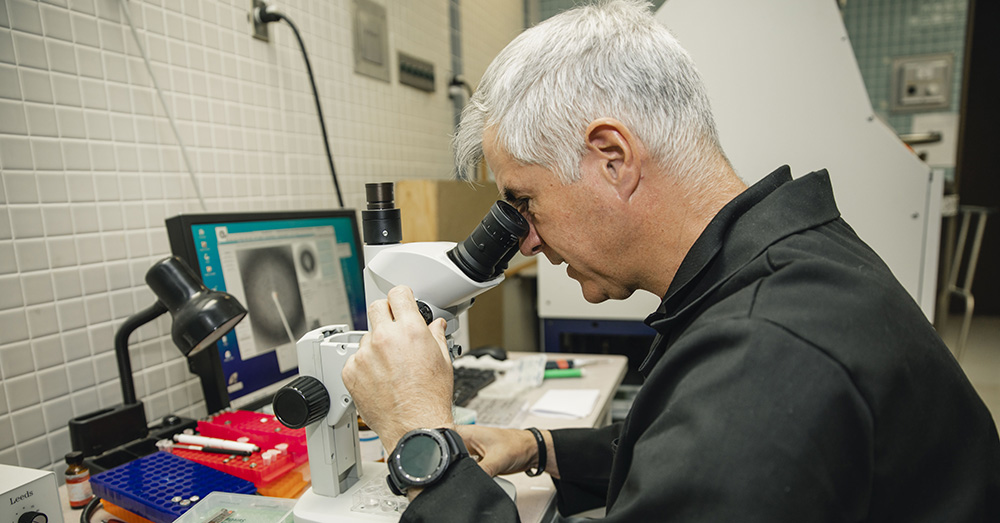TTUHSC’s Sutton Receives Grant from Lupus Research Alliance To Continue Work on Potential Treatment for Rare Form of Disease

The Lupus Research Alliance (LRA) recently named R. Bryan Sutton, Ph.D., a professor in the Department of Cell Physiology and Molecular Biophysics at the Texas Tech University Health Sciences Center (TTUHSC), as a recipient of a 2020 Lupus Mechanisms and Targets Award (LMTA). The grant could provide Sutton up to $200,000 a year for up to three years to continue his research into possible mechanisms that could cause or contribute to lupus in hopes of developing novel biological targets and strategies for designing new medicines to treat the disease.
“The focus of the LRA grant mechanism that we were awarded is therapeutics,” Sutton said. “Most basic research scientists dream that, one day, their research will be used to help sick people. The research funded by the LRA makes this dream much closer for us than it would normally be.”
Though most often diagnosed in young women aged 15 to 44 years, lupus is a chronic and complex autoimmune disease that causes the body’s immune system to erroneously attack healthy cells and potentially harm many parts of the body. While the cause of lupus remains a mystery, the disease can cause widespread inflammation and tissue damage that can impact the patient’s joints, skin, brain, lungs, kidneys and blood vessels. Effective treatments for lupus are available, but there is no known cure.

R. Bryan Sutton, Ph.D.
Sutton said there are rare cases of childhood lupus that are caused by the poor function of DNase1L3, an enzyme that typically removes DNA that is leftover from cells after they die. Lupus patients often have lower amounts of Dnase1L3, and when this enzyme does not function correctly, autoantibodies can be produced in response to the excess DNA. The antibodies for DNA can then lead to inflammation and tissue damage.
Although injecting this enzyme might help, Sutton said it wouldn’t last long enough in the patient to be an effective medicine. With help from the LRA grant, Sutton, his graduate student Jon McCord and Peter Keyel, Ph.D., from the Texas Tech University Department of Biology will design a new version of Dnase1L3 to overcome this limitation. Their hope is that this modified version of Dnase1L3 can then be used as a potential treatment for lupus.
Sutton’s lab has expertise is in protein structure, especially producing and crystallizing protein molecules, then using X-ray with the crystals to determine the protein’s 3D structure. Because of this expertise, Keyel invited the Sutton lab several years ago to collaborate with his lab to crystalize Dnase1L3. McCord took on the project for the Sutton lab and managed to express, purify and crystallize the Dnase1L3 from material that was made in bacteria.
“We didn’t think anything of it, since that’s what we do every day, but apparently we’re the only lab in the world who has accomplished this feat,” Sutton said. “Dnase1L3 is a difficult enzyme to work with since it has traditionally been hard to purify from human serum, but we can now make milligrams of Dnase1L3 in bacteria.”
Sutton said being able to work on large quantities of Dnase1L3 alone would be a boon to the lupus community, especially since McCord went on to crystallize the enzyme and solve the enzyme’s 3D structure.
“Now that we can physically look at the Dnase1L3 enzyme up close and personal, we can answer questions about how the enzyme functions, and we can directly address what the mutations that cause lupus erythematosus do to the enzyme” Sutton added.
The Lupus Research Alliance is the largest non-governmental, non-profit funder of lupus research worldwide. The alliance works to unite the global lupus community in bold determination to free the world of the disease through the power of science.
Related Stories
Celebrating Veterans: TTUHSC’s General Martin Clay’s Legacy of Service and Leadership
From his initial enlistment in the Army National Guard 36 years ago to his leadership in military and civilian health care management roles, Major General Martin Clay’s career has been shaped by adaptability, mission focus and service to others.
Texas Tech University Health Sciences Center School of Nursing Named Best Accelerated Bachelor of Science in Nursing Program in Texas
The TTUHSC School of Nursing Accelerated Bachelor of Science in Nursing (BSN) program has been ranked the No. 1 accelerated nursing program in Texas by RegisteredNursing.org.
TTUHSC Names New Regional Dean for the School of Nursing
Louise Rice, DNP, RN, has been named regional dean of the TTUHSC School of Nursing on the Amarillo campus.
Recent Stories
The John Wayne Cancer Foundation Surgical Oncology Fellowship Program at Texas Tech University Health Sciences Center Announced
TTUHSC is collaborating with the John Wayne Cancer Foundation and has established the Big Cure Endowment, which supports the university’s efforts to reduce cancer incidence and increase survivability of people in rural and underserved areas.
TTUHSC Receives $1 Million Gift from Amarillo National Bank to Expand and Enhance Pediatric Care in the Panhandle
TTUHSC School of Medicine leaders accepted a $1 million philanthropic gift from Amarillo National Bank on Tuesday (Feb. 10), marking a transformational investment in pediatric care for the Texas Panhandle.
Texas Tech University Health Sciences Center Permian Basin Announces Pediatric Residency Program Gift
TTUHSC Permian Basin, along with the Permian Strategic Partnership and the Scharbauer Foundation, Feb. 5 announced a gift that will fund a new pediatric residency.
